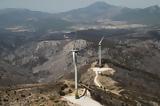Greece’s Renewable Energy Sector Faces Financial Strain as Grid Failures Mount
Greece’s once-thriving renewable energy sector is facing mounting challenges that could jeopardize its future.
Just a few months into 2025, curtailments in green electricity production—primarily from solar and wind sources—have already matched the total seen
This sharp increase in energy that is produced but not utilized is causing a steep drop in revenues for companies that have invested in clean power, from small producers to major developers.
Curtailment refers to situations in which renewable energy is generated but not fed into the national power grid. This often happens when electricity demand is low—such as during midday hours or weekends—and the grid cannot absorb all the available supply. As a result, the surplus energy goes unused and unpaid, directly impacting producers’ income and undermining the profitability of renewable energy investments.
The situation is growing increasingly dire for many operators who see no clear solution on the horizon. The lack of a comprehensive government response has left the industry in a state of uncertainty. One potential remedy—large-scale energy storage—has been slow to materialize. Battery systems that could store excess electricity for later use have long been viewed as essential to stabilizing renewable production.
However, progress on these systems has been sluggish. While some storage projects have been announced, development is proceeding at a glacial pace. In many cases, the absence of financial incentives such as subsidies or grants has made investment in battery technology economically unviable, particularly for retrofitting existing solar installations.
This wave of curtailments and the resulting loss of income is beginning to reverberate through Greece’s financial sector. Banks, many of which have heavily financed solar and wind projects, are growing increasingly concerned. With energy production far below initial forecasts due to reduced grid absorption, many smaller and mid-sized companies now find themselves unable to repay loans based on outdated revenue expectations. Industry insiders warn that this is not a problem confined to a few struggling companies; it is a systemic issue that threatens the entire investment portfolio of the renewable energy sector.
The crisis is also undermining the commercial value of renewable assets. Projects hit by repeated curtailments are losing market value, with solar farms and wind turbines—often used as collateral for loans—now yielding much lower returns than anticipated. This presents a significant risk for banks, which could be left with devalued assets if borrowers default.
Signs of strain are already visible. A growing number of solar energy projects are being put up for sale, with owners seeking to cut their losses or exit the sector altogether. Many of these sales are occurring at prices below the original value of the assets, reflecting a broader trend of devaluation that poses a potential threat to banking stability.
At the same time, banks are becoming more hesitant to issue new loans for renewable energy projects. Credit assessments are becoming more stringent, and borrowing costs are rising, creating yet another obstacle for an industry already facing diminished investor confidence.
#ENGLISH_EDITION #GREECE- Δημοφιλέστερες Ειδήσεις Κατηγορίας Ειδήσεις
- Το νέο ξέσπασμα του Σεφερλή και η στήριξη της Γκερέκου στον Βέρτη
- Μπριζίτ και Εμανουέλ Μακρόν: Νιώθουν πανικό και απελπισία μετά το viral χαστούκι
- Θεσσαλονίκη: Έξι προσαγωγές μετά την ανταλλαγή πυροβολισμών στη Θέρμη – Άνδρες της ΕΥΠ δέχτηκαν επίθεση
- Ζάκυνθος: Πώς έφτασαν οι αστυνομικοί στην εξιχνίαση της δολοφονίας της συμβολαιογράφου – Η ανακοίνωση της ΕΛΑΣ
- Νεκρή βρέθηκε 14χρονη στη Νάπολη – Την αναζητούσαν επί δύο ημέρες
- Συναντήθηκε ο Κυρανάκης με τους οδηγούς ταξί
- Φινλανδία, Σουηδία και Νορβηγία θα κατασκευάσουν σιδηροδρομικό σταθμό για τη μεταφορά στρατευμάτων και όπλων στα ρωσικά σύνορα
- «Πράσινο φως» για τη δημοπρασία των κοσμημάτων της Ζωής Λάσκαρη – Όσα είπε ο Τσαγκαράκης
- Η μυστική επιχείρηση της ΕΥΠ και οι πυροβολισμοί από την τουρκική μαφία: Πώς έγινε το περιστατικό στη Θεσσαλονίκη
- Ποιες είναι οι νεότερες εξελίξεις στη διάγνωση και τη θεραπεία της σκλήρυνσης κατά πλάκας
- Δημοφιλέστερες Ειδήσεις Dikaiologitika
- Greece’s Renewable Energy Sector Faces Financial Strain as Grid Failures Mount
- Greece Sets Up Interministerial Committee to Vet Foreign Investments for National Security
- Τοξικά φυτοφάρμακα σε ταμπόν, σε επικίνδυνα επίπεδα - Εισέρχονται απευθείας στο αίμα
- Τροχαίο για τον δήμαρχο Πάτρας Κώστα Πελετίδη: Συγκρούστηκε με αστικό λεωφορείο
- «Μπορούμε τώρα να μειώσουμε στο μισό το κόστος ενός ακριβού αντικαρκινικού φαρμάκου», λέει Έλληνας επιστήμονας
- Αντίθετος ο Άδωνις με την παραπομπή Καραμανλή

- Τελευταία Νέα Dikaiologitika
- Greece’s Renewable Energy Sector Faces Financial Strain as Grid Failures Mount
- Αντίθετος ο Άδωνις με την παραπομπή Καραμανλή
- Greece Sets Up Interministerial Committee to Vet Foreign Investments for National Security
- Τροχαίο για τον δήμαρχο Πάτρας Κώστα Πελετίδη: Συγκρούστηκε με αστικό λεωφορείο
- «Μπορούμε τώρα να μειώσουμε στο μισό το κόστος ενός ακριβού αντικαρκινικού φαρμάκου», λέει Έλληνας επιστήμονας
- Τοξικά φυτοφάρμακα σε ταμπόν, σε επικίνδυνα επίπεδα - Εισέρχονται απευθείας στο αίμα
- Ατύχημα με τραμ στην Γλυφάδα
- Ανοίγει το μεγαλύτερο LEGOLAND παγκοσμίως
- ΑΣΕΠ - Δημοτική Αστυνομία: Παράταση δελτίου για τις υγειονομικές εξετάσεις
- Κλέαρχος Μαρουσάκης: Κορυφώνεται το κύμα αστάθειας - Διήμερο κακοκαιρίας
- Τελευταία Νέα Κατηγορίας Ειδήσεις
- Κραυγή αγωνίας από τα άτομα με Σακχαρώδη Διαβήτη
- Υπουργείο Παιδείας: Νέα ψηφιακή πλατφόρμα για την αναβάθμιση του ΚΕΔΑΣΥ και των υπηρεσιών του
- Θεσσαλονίκη: Έρχεται στα δυτικά ακόμα μία Λευκή Νύχτα με πολύ χορό, ζωντάνια και κέφι
- Χατζηδάκης: «Η ιστορία δικαίωσε τον Καραμανλή και μαζί τη Νέα Δημοκρατία» για την ένταξη στην ΕΟΚ
- Η Ρωσία αναχαίτισε σχεδόν 300 ουκρανικά drones τη νύχτα
- Δημήτρης Μακαλιάς: «Χτίζω αναχώματα για να σταματάει η κατρακύλα»
- Στη σιωπή της νύχτας, η Πάτρα κινείται σε... διαφορετικούς ρυθμούς (video)
- Σπάρτης Ευστάθιος: Η Ανάσταση του Χριστού δίδει ελπίδα



